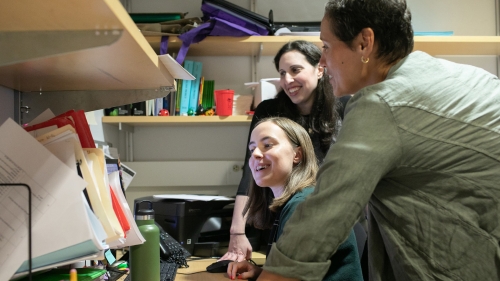
Diane Hughes is professor of Applied Psychology in the Steinhardt School of Culture, Development, and Education. Her research focuses on (a) understanding how racial/ethnic dynamics influence people's experiences at work, in classrooms, in neighborhoods, and in families, and (b) ethnic and cultural differences in parents' socialization goals, beliefs, and practices, especially as these influence children's learning. Dr. Hughes conducts school and community based studies with adolescents and their parents using multiple methods (interviews, surveys, focus groups). In her most recent work. she and her students have been continuing to analyze data from survey and interview based research with adolescents and their caregivers who were followed from the time they entered middle school through their junior year of high school to understand how varied stressors and supports influenced academic and socio-emotional development over time. Hughes received her B.A. in Psychology and African American Studies from Williams College and her Ph.D. in Community and Developmental Psychology from the University of Michigan. She is former chair of the John d. and Catherine T. MacArthur Foundation's sub-group on Diversity in Mid-Life and co-chair of the 14 member cross-university Study Group on Race, Culture, and ethnicity. Her research has been supported by the Carnegie Corporation of New York, the John D. and Catherine T. MacArthur Coundation, the William T. Grant Foundation, the National Science Foundation, and the National Institute of Child Health and Human Development.
Selected Publications
- Del Toro, J. & Hughes, D.L.(2019). Trajectories of discrimination across the college years: associations with academic, psychological, and physical adjustment outcomes. Journal of youth and adolescence, 1-18.
- Hughes, D. L., Del Toro, J.& Way, N.. (2017). Interrelations among dimensions of ethnic-racial identity during adolescence. Developmental Psychology, 53, 2139-2153. doi:10.1037/dev000040
- Hughes, D., Del Toro, J., Harding, J. F., Way, N. & Rarick, J.R. D. (2016). Trajectories of discrimination across adolescence: Associations with academic, psychological, and behavioral outcomes. Child Development, 87, 1337-1351. doi:10.1111/cdev.12591
- Harding, J. F, Hughes, D. L. & Way, N. (2017). Racial/ethnic differences in mothers' socialization goals for their adolescents. Cultural Diversity and Ethnic Minority Psychology, 23, 281-290. doi:10.1037/cdp0000116
- Hughes, D. L., Del Toro, J., & Rarick, J. R. (2016). Egalitarian Socialization in Ethnically Diverse Families. In L. Balter and C. Tamis LeMonda (eds). Child Psychology: A Handbook of Contemporary Issues, New York University Press, 401 - 430.
- Hughes, D. L, Watford, J. A. & Del Toro, J. (2016). A transactional/ecological perspective on ethnic-racial identity, socialization, and discrimination. Horn, Stacey S [Ed], Ruck, Martin D [Ed], Liben, Lynn S [Ed]. Equity and justice in developmental science: Implications for young people, families, and communities., Vol. 2 San Diego, CA, US: Elsevier Academic Press, US; pp. 1-41. Retrieved from http://ovidsp.ovid.com/ovidweb.cgi?T=JS&PAGE=reference&D=psyc13&NEWS=N&…;
- Hughes, D. L, McGill, R. K., Ford, K.l R. & Tubbs, C. (2011). Black youths' academic success: The contribution of racial socialization from parents, peers, and schools. Hill, Nancy E [Ed], Mann, Tammy L [Ed], Fitzgerald, Hiram E [Ed]. African American children and mental health, Vols 1 and 2: Development and context, Prevention and social policy. Santa Barbara, CA, US: Praeger/ABC-CLIO, US; pp. 95-124. Retrieved from http://ovidsp.ovid.com/ovidweb.cgi?T=JS&PAGE=reference&D=psyc8&NEWS=N&A…
- McGill, R. K., Hughes, D., Alicea, S. & Way, Ne. (2012). Academic adjustment across middle school: The role of public regard and parenting. Developmental Psychology, 48, 1003-1018. doi:10.1037/a0026006
- Hughes, D., Rivas, D. Foust, M., Hagelskamp, C., Gersick, S., & Way, N. (2008). How to catch a moonbeam: A mixed-methods approach to understanding ethnic socialization in ethnically diverse families. In S. Quintana & C. McKnown (Eds.) Handbook of race, racism, and child development. New Jersey: John Wiley and Sons.


